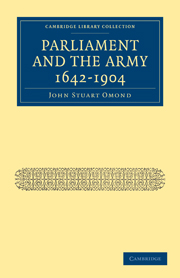Summary
Although the long struggle described in the preceding pages came to an end when the Army Council was established, it may not be out of place to touch upon certain subsequent developments connected with the control of the armed forces.
As has been seen, many of the schemes inaugurated during the Cardwell regime at the War Office were unfinished when he resigned the seals of office. It was left to others to build upon the foundations he had laid, and it took thirty-four years to give effect to many details of the policy he had initiated. These years witnessed the gradual creation of a bolder and less petty outlook on questions of national and imperial defence. The path of progress was stony, and many vicissitudes were encountered. Nevertheless, the advance, in spite of the humiliating episode of the war in South Africa, was made successfully, and a new outlook on military affairs characterised the opening years of the present century.
The weakness in military organisation which had been so ruthlessly exposed during that campaign led to the production of a series of proposals for army reform, but nothing had been carried into effect by the time that Balfour's government went out of office in 1905. The difficulties of the political situation abroad and at home were not without their influence on the development of our military plans. The salient features may be recalled in a few sentences. The international situation gradually assumed a threatening complexion.
- Type
- Chapter
- Information
- Parliament and the Army 1642–1904 , pp. 159 - 170Publisher: Cambridge University PressPrint publication year: 2009



